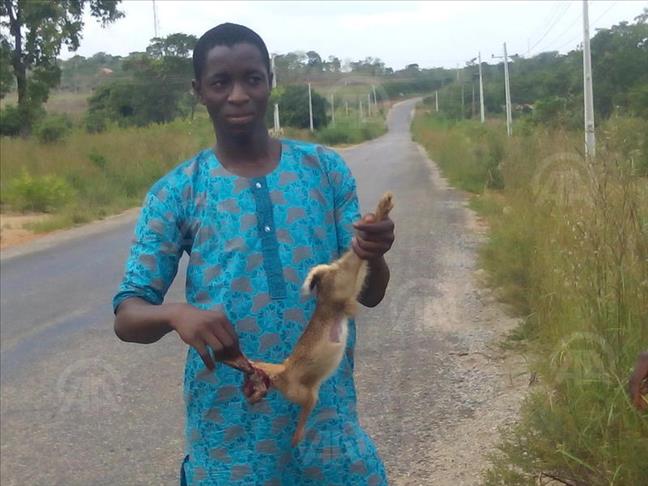
LAGOS (AA) – Whether roasted, fried or cooked in red oil, mice are a prized source of meat for many Nigerians, especially well-heeled artisans and blue-collar government officials who frequent local kitchens in the country's southwest for a meal of pounded yam and mouse.
So popular is the rodent meat that it is far costlier than the beef and goat meat available in local kitchens.
The small animals' parts are usually fragmented for easy cooking – and huge profits.
Cooks generally buy their mice from travelers coming from the countryside, where hunters – or their sons – and Hausa-Fulani herdsmen display them for sale on the highway.
Depending on its size, an entire mouse generally goes for between 2,500 and 4,000 Nigerian naira (between about $15.5 and $25) on the highway.
The antelope, along with other wild, difficult-to-come-by animals, is referred to as "bush-meat" in local kitchens.
Mice – and indeed all such bush meat, generally referred to in the Yoruba language of southwest Nigeria as "erangbe" – have a special draw for many.
"I call it 'special meat' because it is sweet and natural," Wasiu Omotunde, a local engineer at the Jankara Market in the Ijaiye Ojokoro suburb of Lagos, told Anadolu Agency.
"I love it."
Omotunde noted that mouse and other erangbe are not easy to find.
He said that customers scramble to get a taste of them at eateries in which the delicacies are available in small quantities.
"I cannot remember ever cooking it at home with my family," said Omotunde.
"It is not something you go to any market and see."
Asked how he became a fan of mouse meat, Omotunde recalled how he had grown up in the countryside hunting for the savory rodent and other animals.
"Before he died, my father was a hunter," he said. "We would accompany him to farm where we dug holes for the mice and others, like rabbit."
"It was the best meat available to us, so I grew up liking it," said Omotunde.
Hunting is not subject to many restrictions in Nigeria, so people often hunt for mice and other animals, especially in the countryside.
- Special dish -
The scarcity of erangbe made it a major attraction among city dwellers.
"It is an escape from the routine cow meat, fish and other things that one takes every day at home," said Omotunde.
"So anytime I eat out, I ensure I take erangbe, including okete [mouse]," he added.
Another mouse-eater, Sola Akintunde, agrees.
"Cow meat is available, just like fish and other meats that are common and readily available here," he told AA.
"Not so with erangbe. Very few kitchens have it because they normally bring the meat from the village," Akintunde explained.
"People also buy it along the expressway, though it's expensive," he added.
Grace Olusoji, owner of Mama Yemi Kitchen in the Iyana Ipaja area of Lagos, said she normally planned ahead for mouse meat and other erangbe.
"There is always a good market for it," she told AA. "Mice and other bush meats appeal to people because they seem to be one-off thing."
"They are not available everywhere, like meat or fish," she added. "They are scarce and hard to find."
Accoriding to Olusoji, her customer base cuts across Nigeria's social divides.
"The elite who eat the mice and other erangbe do so because they are running away from the usual red meat, which doctors now say is dangerous to the human health," she explained.
"Besides, many of them only eat erangbe in the afternoon when they are not home," Olusoji added.
"It is a refuge from what is common."
englishnews@aa.com.tr
Anadolu Agency website contains only a portion of the news stories offered to subscribers in the AA News Broadcasting System (HAS), and in summarized form. Please contact us for subscription options.

